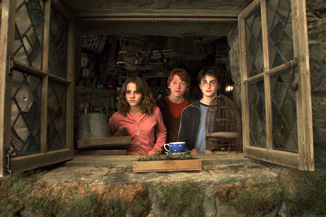Movie Review:
Harry Potter and the Prisoner of Azkaban
By David Parker
June 1, 2004
BoxOfficeProphets.com

I'm surprised to say there was none. The best book so far has turned out to be the best movie as well. While not all of the aforementioned magic is in this adaptation, there are no missteps. The performances are all well done, especially by two of the newcomers: David Thewlis as Professor Lupin
and Gary Oldman as Sirius Black. The darker tone of The Prisoner of Azkaban novel is both seen and felt in Cuaron's adaptation. The gold and orange tones of the first two films are replaced by muted silver and gray. Death, anger and revenge become an even greater part of Harry's life. Cuaron has made an emotionally compelling and satisfying film that could stand on its own outside of the pedigree.
That isn't to say that the Prisoner of Azkaban is without faults. The first hour of the film felt exactly as the other two had been criticized for being: going from plot point to plot point, stopping only for wordy exposition. But that is the price we pay for movie adaptation of an unfinished book series controlled directly by the author. Cuaron seems only allowed to leave his directorial mark on superfluous parts of the story - a wizard choir ominously singing "Something Wicked This Way Comes," an amusing way to show seasonal changes, through Hogwart's most famous tree, and some fun establishing shots that zoom into a Hogwart's clock.
My guess is that the Harry Potter films will only achieve greatness when Rowling lets a director take full control. Of course, with books six and seven still unwritten, a directorial "change" in the film version of Azkaban or Goblet of Fire, however small, could lead to a huge story conflict in future films. It is a house of cards, and only Rowling truly knows if the two of clubs can be thrown aside without any structural damage.
The plot, for the one person seeing the film without reading the book, has Harry Potter in his third year at Hogwarts. After blowing up his wicked Aunt at Privet Drive, Harry leaves the Dursley's only to be picked up by a ghostly bus and taken to safer quarters. It's at the Leaky Caldron that Harry learns that Sirius not only has escaped from Azkaban, but also may be trying to kill him. The story goes that Sirius, a loyal servant of Voldemort, has been stored away in Azkaban prison for 12 years after betraying Harry's parents and murdering his friend. Now he's out and wants to reunite with his master, and for a bonus, take out Harry Potter.
So with Black on the loose, the Azkaban prison guards, the Dementors, have been sent to Hogwarts. Icy cold and ethereally spooky, the Dementors on film separate themselves from the RingWraith knockoff that they became, for me, in the books. Harry seems to be greatly affected by the Dementors, fainting almost at the mention of them. There is an effective scene during a Quidditch match where Harry, chasing a snitch through a stormy sky, is confronted by a few dementors. Later in the film, the full ghastly regiment surrounds two lonely figures by a pond. The fiends are repelled in such a mysterious fashion that only on repeat viewing do we see the full truth. Luckily, the film takes care of that for us.
The climactic confrontation at the Shrieking Shack does have the same forced perspective that the books had. The characters only behave a certain way to keep up the suspense just that much longer. But the scene is wonderful nonetheless. Gary Oldman was born to play Sirius Black.
I felt that Professor Lupin had just the right warmth and aloofness for the role. It's a tough job being the Defense Against the Dark Arts teacher at Hogwarts. Where is the Joe Paterno of the wizarding world to turn that position into a rock of stability? Daniel Radcliffe has been unfairly criticized as Harry Potter. You can see the anger and courage lying within him.
For all the talk of Cuaron possibly killing the story with obvious sexuality, I didn't see it. In fact, the upfront physical relationship of Hermione and Harry is just as it is in the book: a brother/sister dynamic with no hint of romance.
This is one of the three middle acts to Harry Potter and the comparisons to The Empire Strikes Back are bound to occur. There are parallels if you look close enough, but the main thing both films do, and what every good middle film does, is leave you wanting resolution. Here's hoping the climax is as good as the setup.